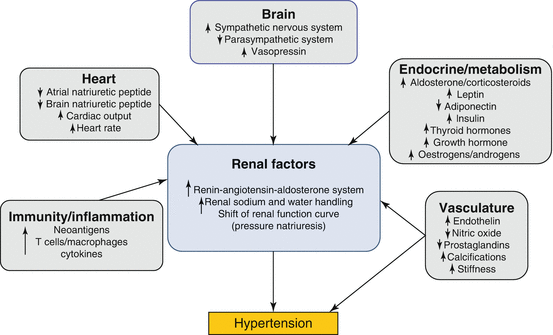Hypertension: Causes, Symptoms, Pathogenesis, Treatment And MCQs for NEET, GPAT, CSIR NET JRF
” Hypertension simply means abnormal increase in blood pressure.”
INTRODUCTION :-
- Elevated blood pressure is a staggering health problem.
- It is very common, its consequences are widespread and sometimes devastating and it also remain asymptomatic until late in its courses.
- Hypertension is one of the most important risk factor in both coronary heart disease and cerebrovascular accident, it may also lead to congestive heart failure, renal failure and aortic dissection.
- A sustained diastolic pressure in excess to / greater than 90 mm Hg or a sustained systolic pressure in excess of 140 mm Hg are generally considered to constitute hypertension.
- Hypertension is more vulnerable or severe in young adults in compare to older ones.
CAUSES :-
There are two types of high blood pressure :-
A.] Primary (essential) hypertension :- For many adults, there’s no identifiable cause of high blood pressure. This type of high blood pressure, called primary or essential hypertension, tends to develop gradually over many years.
B.] Secondary hypertension :- Some people have high blood pressure caused by the underlying situations :
- Obstructive sleep apena.
- Kidney problem.
- Thyroid problems.
- Adrenal gland tumors.
- Certain defects related to congenital defect in blood vessels.
- Illegal drugs such as cocaine and amphetamines.
This type of high blood pressure, called secondary hypertension, tends to appear suddenly and causes high blood pressure than does primary hypertension.
SYMPTOMS :-
A person with hypertension may not notice and symptoms, and so people often call it the “silent killer”. Without detection, hypertension can damage the heart, blood vessels, and other organs,, such as kidneys. In rare and severs cases, high blood pressure causes sweating, anxiety, sleeping problems, and blushing. However, most people with hypertension will experience no symptoms at all. A person may also experience headaches and nosebleeds.
PATHOGENESIS :-
Blood pressure is a complex trait that is determined by the interaction of multiple genetic and environmental factors. Therefore it should not be surprising that the pathogenesis of hypertension remains an enigma. Because the potential mechanism of hypertension constitute aberrations of normal regulatory processes, the physiologic regulation of blood pressure. Maintenance of normal blood pressure is dependent on the balance between the cardiac output and peripheral vascular resistance. It follows that patients with arterial hypertension may have an increase in cardiac output an increase in systemic vascular resistance or both. While this conceptual framework is used to understand the final physiological alterations leading to elevated BP, it is now well established that multiple renal, neural, endocrine and CV control system can affect cardiac and vascular homeostasis, making the pathophysiology of hypertension extremely complex.

TREATMENT :-
People can use specific medications to treat hypertension. Anti hypertensive medication will usually only have minor side effects.
Medication for hypertension includes :-
- Diuretics, including thiazides, chlorthalidone, and indapamine.
- Beta blockers and alpha blockers.
- Calcium Channel blockers.
- Vasodilators.
- Central agonists.
- Angiotensin receptor blockers, etc.
Anyone on anti hypertensive medications should carefully read the label of any over the counter (OTC) drug that may also take, such as decongestants. These OTC drugs may interact with the medications they are taking to lower their blood pressure.
MULTIPLE CHOICE QUESTIONS [MCQs] :-
1.] At what age should you have your first screening of high blood pressure ?
a. 16
b. 18
c. 30
d. 50
2.] The numbers in a blood pressure reading ?
a. Vary, depending on the time of day your blood pressure is checked
b. Get lower with high levels of stress
c. Are the same for people of the same age and weight
d. Stay the same through out the day
3.] What is the most common symptom of high blood pressure ?
a. Racing heart beat
b. High body temperature
c. Fatigue
d. It has no symptom that you notice
4.] Which of these can increase your risk of high blood pressure ?
a. Obesity
b. A family history of high blood pressure
c. Smoking
d. All of the above
5.] At what point is blood pressure considered “high” ?
a. 120 over 80
b. 137 over 80
c. 140 over 90
d. 210 over 120
6.] High blood pressure is the main cause of which of the following ?
a. Cancer
b. Stroke
c. Diabetes
d. Congestive heart failure
7.] Which of these contribute to high blood pressure ?
a. Getting a lot of Vitamin C
b. Drinking a lot of alcohol
c. Getting a lot of Calcium
d. All of the above
8.] In which age group of men does the risk of high blood pressure go up ?
a. 40 to 49
b. 50 to 59
c. 60 to 69
d. 70 to 79
9.] Why does reducing how much salt you eat help prevent high blood pressure ?
a. It reduce fluid buildup in body
b. It allows vessels to relax
c. It raises level of HDL (“good”) cholesterol
d. It helps keep your heart beat stable
10.] What can you do to control high blood pressure ?
a. Get go and stay at a healthy weight
b. Exercise regularly
c. Take the blood pressure medicine prescribed by your doctor
d. All of the above
SOLUTIONS :-
1.] (b) 18
2.] (a) Vary, depending on the time of day your blood pressure is checked
3.] (d) It has no symptom that you notice
4.] (d)
5.] (b) 137 over 80
6.] (b) Stroke
7.] (b) Drinking a lot of alcohol
8.] (b) 50 to 59
9.] (a) It reduce fluid buildup in body
10.] (d)
List of Successful GPATINDIAN CANDIDATES
REFERENCES :-
1.] Robbin’s Basic Pathology; 5th edition; Page no. 484 – 485.
2.Burnier M., Wuerzner G. (2015) Pathophysiology of Hypertension. In: Jagadeesh G., Balakumar P., Maung-U K. (eds) Pathophysiology and Pharmacotherapy of Cardiovascular Disease. Adis, Cham. https://doi.org/10.1007/978-3-319-15961-4_31